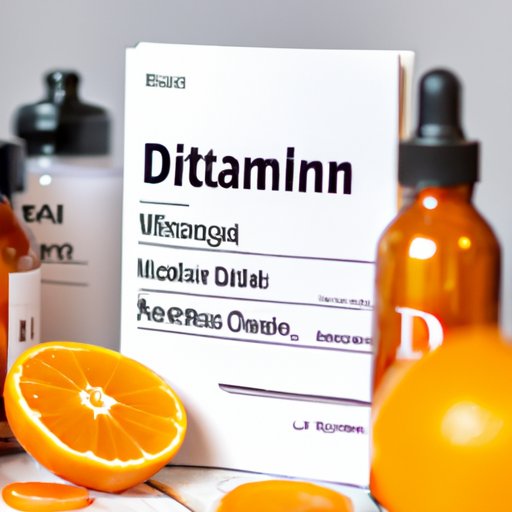The Truth About Vitamin D: Can You Take Too Much?
Vitamin D is essential for our body and its benefits cannot be overlooked. It contributes to the health of our bones and teeth, our immune system, and our overall wellbeing. Besides natural sources like sunlight and certain foods, many people turn to supplements to boost their vitamin D intake. But is it possible to take too much vitamin D? In this article, we will explore vitamin D toxicity, safe levels of intake, potential side effects, and how to maintain a healthy vitamin D intake.

Exploring the Risks of Vitamin D Toxicity
Vitamin D toxicity, also called hypervitaminosis D, occurs when the body accumulates too much vitamin D. This is a rare condition as our body only produces a specific amount of vitamin D from exposure to sunlight and has a limited capacity to absorb supplements. However, excess vitamin D can lead to an imbalance of calcium and phosphorus, which can cause damage to vital organs such as the kidneys, liver, and heart.
Causes of vitamin D toxicity can happen when we take too many supplements and consume too many foods that contain high levels of the vitamin. Vitamin D is fat-soluble and can remain in the body’s fatty tissues. As a result, it can accumulate in the bloodstream and pose a potential health risk.
Identifying the symptoms of vitamin D toxicity can be tricky as they are often similar to common health issues, such as fatigue, nausea, and sometimes bone pain. In severe cases, vitamin D toxicity can cause vomiting, muscle weakness, fatigue, and kidney damage.
Safe Levels of Vitamin D Intake
The recommended daily allowance (RDA) of vitamin D for individuals is relatively low, typically around 400-800 IU per day depending on age. However, the safe upper limit of vitamin D for adults is set at 4,000 IU per day. It’s important to note that this recommendation includes both dietary sources and supplements. Individuals who are deficient in vitamin D may require higher doses of supplementation, which is why it’s essential to consult with a healthcare provider before taking high doses of vitamin D supplements.
To avoid taking too much vitamin D, individuals can monitor their intake through food and supplements. Reading labels carefully and taking only the recommended dosage of supplements can reduce the risk of overconsumption. Blood tests can also indicate whether an individual has adequate vitamin D levels.
Potential Side Effects of Excess Vitamin D Consumption
While vitamin D is essential for our body, too much of it can cause unwanted side effects. Some of the most common short-term side effects of vitamin D toxicity include nausea, vomiting, and constipation.
In the long-term, excess vitamin D consumption raises the levels of calcium in the bloodstream, leading to a condition called hypercalcemia. Hypercalcemia can cause bone pain, kidney damage, and even heart problems.
The Relationship Between Vitamin D and Other Supplements
When it comes to vitamin supplements, taking excessive amounts of one type can interfere with the absorption of others. For example, taking high doses of vitamin D can decrease the absorption of vitamin K, leading to an increased risk of blood clotting. Taking a balanced mix of necessary nutrients and supplements can help prevent the potential risks of vitamin overload and improve our overall health.
It’s important to note that taking too many supplements of any kind in general can lead to negative health outcomes, and consulting a healthcare provider before starting any new supplement regimen is recommended.
Role of Doctors and Healthcare Professionals
Doctors and healthcare professionals play an essential role in monitoring and advising on vitamin D intake. Consulting with a healthcare provider can help individuals determine whether they are getting enough vitamin D, whether they need to take supplements, and how much they should take per day.
Vitamin D levels can be measured through a simple blood test. This test can detect whether an individual has a deficiency or is taking too much vitamin D. Testing can be particularly helpful for people who have a hard time getting enough vitamin D through natural sources alone or for individuals who take high-dose supplements.
Tips on How to Maintain a Healthy Vitamin D Intake
Apart from supplements, individuals can maintain healthy vitamin D levels through sunlight exposure and a balanced diet. Sun exposure is an excellent source of vitamin D as the sun’s ultraviolet rays trigger vitamin D synthesis in the skin. Spending some time outdoors, even just 10-15 minutes per day, can help boost our vitamin D levels.
Food sources of vitamin D include fatty fish, egg yolks, and fortified products such as milk and cereal. It’s essential to consume these foods in moderation and as part of a balanced diet to maintain a safe and healthy intake.
Alternative sources of vitamin D include supplements derived from mushrooms and algae. These supplements are suitable for vegetarians and vegans who do not consume animal products but want to maintain healthy vitamin D levels.
Conclusion
Vitamin D is an essential nutrient that our body needs to function correctly. While it’s essential to consume adequate amounts of vitamin D, it’s equally crucial not to consume too much. Excessive vitamin D intake can lead to several health risks, including organ damage and other long-term health issues. A balanced diet, sunlight exposure, and regular consultation with healthcare professionals can help to maintain healthy vitamin D levels in the body.
